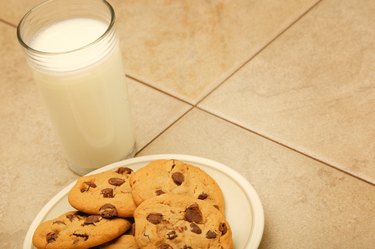
Cancer patients may benefit from avoiding sugar and other carbohydrates. Unlike normal cells, cancer cells can only use glucose, the main component of carbohydrates, as a source of energy. By restricting carbohydrates, you may make it more difficult for cancer cells to grow. There is no evidence cancer patients should not drink milk. However, the high estrogen content in most cow's milk may be an incentive for breast cancer patients to drink only organic milk.
Cancer and Carbohydrates
Video of the Day
Glucose is the cells' preferred fuel. It is less costly to convert into energy than other nutrients. When glucose is limited, the normal cells in the body can metabolize fatty acids, ketone bodies, a byproduct from fat metabolism, and amino acids, the building blocks of protein. According to an article published in the April 2000 issue of "Nutrition Science News," cancer cells are metabolically different. Most of them do not have the enzymes needed to metabolize fat or protein. So they depend on glucose. This means if you restrict carbohydrates, the main source of glucose, you may make it difficult for cancer cells to divide. Without glucose, they may starve to death.
Video of the Day
Clinical Studies
Wurzburg Hospital in Germany conducted clinical studies in 2007 of a diet known as the ketogenic diet. The ketogenic diet is a low-carb, adequate protein and high-fat diet that was originally used as a treatment for epilepsy in children. However, the low carbohydrate content in the diet makes it suitable as a link in the treatment of cancer. The cancer patients who made it to the end of the trial at Wurzburg Hospital all had positive outcomes. In most patients, the tumors had ceased to grow at the end of the trial.
Research on Milk and Cancer
There is no evidence that suggests that you should not drink milk if you have cancer. According to a study published in the October 2004 issue of "The New England Journal of Medicine," there is a link between height and breast cancer. Apparently, milk during childhood can contribute to a greater height but it may also increase the risk of breast cancer. The 2004 study does not show any correlation between current milk consumption and breast cancer.
Estrogens and Breast Cancer
Although you can drink milk if you have cancer, commercially produced milk may be a cause for concern. According to an article in the December 2006 issue of "The Harvard University Gazette," mass producers of milk keep the cows pregnant for most of the year to ensure a high milk production. High quantities of estrogen from the pregnant cows pass into the milk. As there is a link between high estrogen levels and breast cancer, breast cancer patients may want to avoid mass-produced milk. Organic milk may contain less estrogen.
- “Nutrition Science News”; Cancer’s Sweet Tooth; Patrick Quillin; April 2000
- Würzburg Hospital: Information on a Ketogenic (Low Carbohydrate / High Fat + Protein) Diet for Cancer Patients
- Natural Physiques; History of the Ketogenic Diet; Lyle McDonald
- "The New England Journal of Medicine"; Growth Patterns and the Risk of Breast Cancer in Women; M. Ahlgren, et al.; October 2004
- "Harvard University Gazette"; Hormones in Milk Can Be Dangerous; Corydon Ireland; December 2006
- "Time"; Can a High-Fat Diet Beat Cancer?; Richard Friebe; September 2007